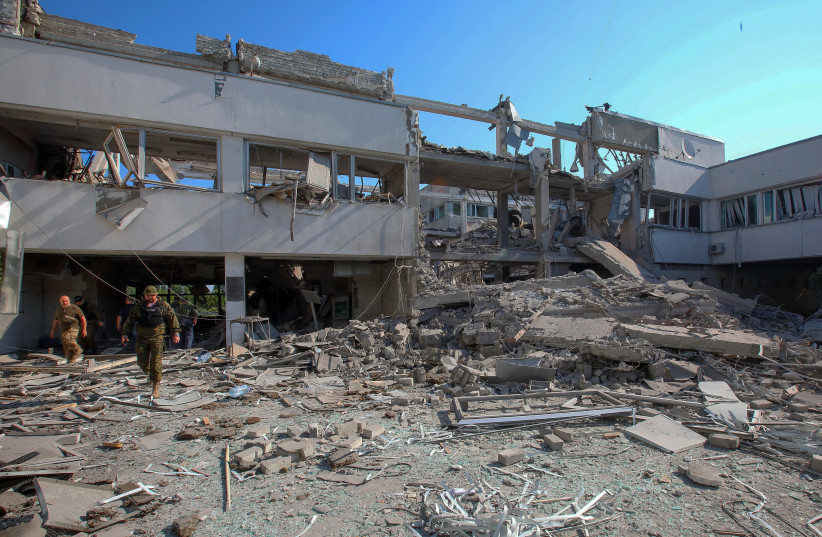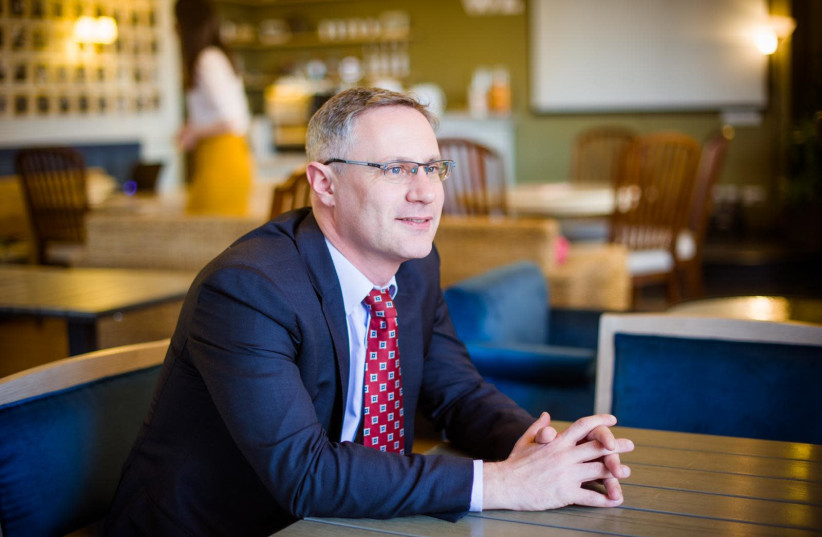The war in Ukraine is likely to go on for a long time – and in all probability will get worse before it gets better. This is the assessment of Israel’s ambassador to Ukraine Michael Brodsky, who is currently on home leave.
In an address on Wednesday night at the annual B’nai B’rith World Center Journalism Awards ceremony that recognizes excellence in Diaspora reportage, Brodsky explained to the audience at the Konrad Adenauer Center in Mishkenot Sha’ananim that although this war is not Israel’s war, in a way it is, because Israel is feeling its impact.
Coincidentally, the ambassador was speaking on the very day that the 30,000th Ukrainian citizen arrived in Israel since the outbreak of hostilities between Russia and Ukraine.
An unpleasant suprise
There had been no anticipation of war until a few days before it actually happened – and even when it did, no one had expected a conflagration of such magnitude, certainly not in Central Europe, said Brodsky, who detoured momentarily to praise the professionalism of Israeli journalists who cover the war, often at risk to their own lives. “They fulfilled their task faithfully,” he said as he outlined some of the hazards they face.
Three days before the war became a reality, he said that found himself in a dilemma. Should he send his staff home to Israel, or keep them in Ukraine to help stranded Israelis, Ukrainian Jews and others who were desperately trying to get to the border?

Of course, they stayed, and they helped in many different ways, regardless of whether the hapless individuals and their families were Jewish or not.
Israel's involvement and interest in Ukraine
Although this is not a war in which Israel is directly involved, Brodsky continued, Israel is affected, and has to mull over many questions. Should Israel show solidarity with right-minded nations? To what extent can the war escalate? Is there a possibility that it will become nuclear?
Other than the grave of Rabbi Nachman of Uman, Israel has no strategic interests in Ukraine, he noted.
Even when it is dangerous for people to come to pray at the graveside, many persist, he said.
AS FOR RUSSIA, the big question for Israel is whether to be part of the West and its sanctions against Moscow or whether to maintain a strategic relationship with it.
Brodsky left no doubt that Israel is on the side of Ukraine, but cautioned that Jerusalem must be careful in what it says and what it does.

The economic issues
Recalling that the Arab Spring was triggered by ever-rising prices – a situation that exists today in many countries around the globe – Brodsky said that before the war, Ukraine was considered to be the breadbasket of the world.
But since the start of the war, it has become increasingly difficult to get wheat out of the country, and as a result, food prices worldwide are escalating. Not only food is affected, but the price of fuel has also gone up considerably, and economic instability is increasing.
In addition to all this is the worrying Russian influence in the Middle East as a whole, and in Syria in particular.
“This is not good for Israel,” Brodsky said.
Something not generally known beyond the hi-tech industry is that some 30,000 Ukrainian programmers work for Israeli hi-tech companies. Some managed to get out of Ukraine, but the majority were forced to remain.
Computer programming teams can work by remote control, but construction workers need to operate on-site. The problem is that since the edict orders able-bodied men to join the army, and does not allow them to leave the country, construction workers must join the army and remain in Ukraine. This has a dire effect on various construction projects in Israel.
Before the war, the ambassador said, many Israelis had substantial real estate investments in Ukraine. The potential then was enormous. But the war turned the real estate industry on its head, and Israelis have suffered grievous losses.
BUT PERHAPS the worst outcome with regard to the Jewish world is that relations with Russian Jews have deteriorated because they are being punished like the rest of Russia, and the sanctions against them have precluded Russian participation in the Maccabiah Games. “Jews in Russia are suffering from international sanctions.”
The Russians assert that they want to “denazify” Ukraine. Brodsky finds this absurd given that the president and previous prime minister of Ukraine are Jewish, as are several people in government and parliament.
The Jewish issue is big in Ukraine, he said. The Ukrainians are aware of the Holocaust, of Babyn Yar, and they draw parallels with what is happening under the Russians.
“This subject keeps cropping up in discussions on the fate of Ukraine,” said Brodsky.
From Israel’s perspective, “this war should end as quickly as possible,” Brodsky concluded. “There are no points of light. We are just beginning to see the implications.”
All three of the prize-winning journalists – Ariel Kahana, the political correspondent of Israel Hayom; Yisrael Katzover, reporter and analyst at Hamodia; and Shlomo Nakdimon of Yediot Aharonot – had some connection with Ukraine, having visited there and/or being of Ukrainian descent.
Katzover urged Ukrainian Jews to make aliyah (immigrate to Israel), saying “You have no other place than in the Land of Israel.”
Since 2014, the awards have been expanded to include entertainers who have fostered Diaspora relations through the arts. This year’s winner was Shuli Natan, who soared to fame with Naomi Shemer’s composition “Jerusalem of Gold,” with which she has been identified throughout her career.
